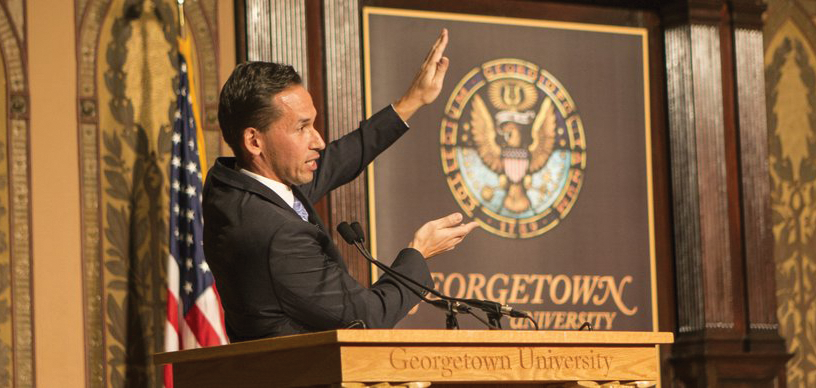
Jose Villalobos is a Hoya Staff Writer.
Last February, government professor Marc M. Howard launched the Prisons and Justice Initiative — a collaborative program of scholars, practitioners and students set to examine the problem of mass incarceration in the United States from multiple academic perspectives, such as social theory and cultural studies — as a starting point for research seeking to influence social reform.
Since its founding, not only has the initiative increased awareness about this issue in the Georgetown community, but it has also continued to push toward prison and criminal justice reforms.
Nearing the two-year anniversary of PJI, Howard released his new book, “Unusually Cruel: Prisons, Punishment, and the Real American Exceptionalism,” in July. Howard’s book delves into the distinctive severity of the American prison system — particularly in comparison to its equivalent judicial structures across Europe.
In an exclusive interview with The Hoya, Howard discussed his newest work exploring the American justice system.
Howard’s first encounter with the law occurred in 1985, when at age 13 he ended up in a jail cell during a trip to London. This event had a lasting impact on his life, he said, and it eventually prompted him to make some important changes in his lifestyle. In the preface to his new book, he reflects on that episode.
“I have often reflected back to a time when my life trajectory could have gone in a different direction. I got a ‘second chance,’ and I made the most of it. Not everybody is so lucky — especially in the United States,” Howard wrote.
Howard’s experience with the justice system became marred with discontent a few years later, when one of his childhood friends was wrongfully convicted of double murder and spent over 17 years working to prove his innocence, until he was finally acquitted. Howard stood by his side, continually working with his legal team.
He reflects upon the incident in his book. He became dismayed by the “horrible injustice that happened,” not only because of the wrongful conviction, but because he realized that the American justice system was, in fact, “so harsh and inhumane.”
After this personal experience, Howard took it upon himself to learn more about prison systems in the United States and work towards criminal justice reform. He received his Juris Doctor from the Georgetown University Law Center while serving as a full-time professor at the university and began working on his latest book. Howard focused on developing comparative research to show how different the United States is from other countries in its incarceration procedures.
“Six or seven of the chapters were written as papers for law seminars, all with a unifying theme: the U.S. is cruel with how it treats people, especially those who have committed crimes,” Howard said.
At the time he began writing “Unusually Cruel,” Howard started teaching at Jessup Correctional Institution in Maryland as part of the Prison Scholars Program, which offers college-level courses for inmates in the state.
“I taught a course that I was also teaching at Georgetown, and I started to realize that many of the conversations I was having with the Jessup students were just as high-level as those I was having at Georgetown,” Howard said.
This realization pushed him to bring the two groups together through a series of joint sessions during the spring 2016 semester at the prison.
“That was just incredible, for everyone involved, and it led me to look into the possibility of eventually bringing students into the prison for a course,” Howard said.
Howard’s efforts culminated in the creation of the Prisons and Justice Initiative. PJI has featured research projects such as associate professor of the department of performing arts Benjamin Harbert’s survey on the development of musical practices inside a Louisiana prison.
Community service and support programs, such as PJI Pals — a mentorship program for children with incarcerated parents — and the Georgetown-Jessup Debate Program — where the Georgetown debate team teaches inside the prison — are also important PJI projects. Additionally, a wide variety of discussions and dialogues, movie screenings, speaker events and focus groups are offered by the initiative.
Howard now has his eyes set on creating a larger prison education program “where faculty teach to incarcerated students and offer Georgetown credits.” He highlights that “a lot of universities are now making these steps in prison education,” referring to Bard College’s prison teaching program as the current golden educational standard because of its wide reach to local penitentiaries and development of various teaching programs. Howard said that a series of studies have shown the drop of recidivism by 43 percent when inmates take just one higher education course.
“The justification is so clear and simple,” Howard said. “There is very powerful evidence that people who are in prison, when they get an educational opportunity, it totally changes their life course, and they can leave a life of crime they were living before.”
Howard believes one of the initiative’s crucial objectives remains to create a sense of awareness at Georgetown that can eventually result in large-scale reform through informed policy proposals.
“The initiative has yet to change the world, or at least this country,” Howard said. “Its ultimate goal is to reduce the extent to which we lock people up in this country for insanely long periods of time in very harsh, punitive conditions.”
Despite acknowledging the limitations of academic research influencing policy, Howard is content with the work that has been done and wants to continue building upon these foundations.
“We have helped show that people who’ve made prior mistakes in their life are still human, are still capable of reform, are still capable of transformation and positive contributions to society,” Howard said.
Howard said he believes Georgetown has been positively impacted by this endeavor.
“Being human and being supportive of other people’s humanity is a benefit for everyone,” Howard said.













